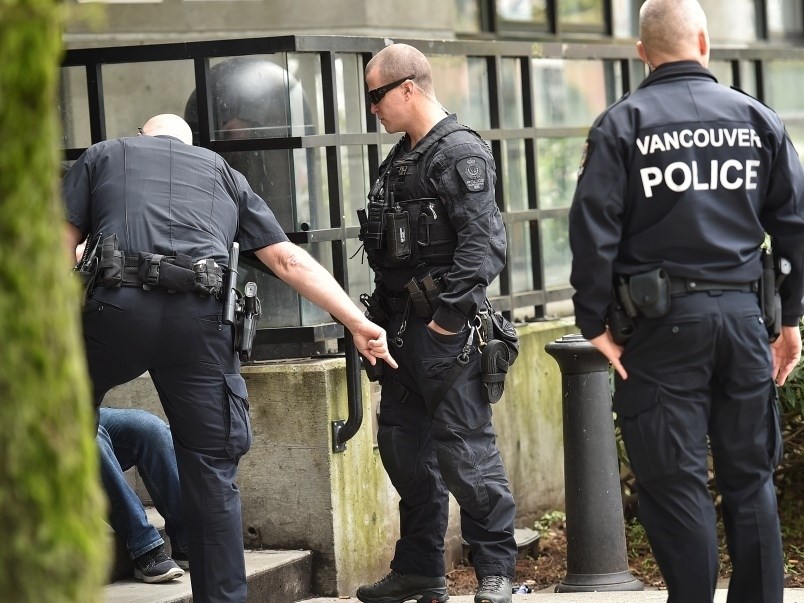The “trespass prevention program” has operated as a pilot program this year in parts of Chinatown and the policing district that includes the downtown business district, Yaletown, the West End and Coal Harbour.
Sgt. Chris Burnham told the Vancouver Police Board Sept. 23 that the department continues to test the program in those areas and that “the next rollout proposed” is to expand the initiative across the city.
The VPD has received about 100 requests from individuals, business operators and business improvement associations from other parts of the city to implement the program in their neighbourhoods.
“The program has successfully reduced the negative impact of trespassers on businesses in areas around Granville Street and the Jim Deva Plaza, and it has helped connect some of those trespassers with housing, overdose prevention sites, mental health care and other services,” Burnham said.
The “negative impact” has been related to camping, drug use, urination and defecation, said Burnham, who wrote a report for the police board that showed 24 assaults occurred against staff at businesses when asking trespassers to leave.
Some of the assaults involved weapons such as knives, pepper spray, needles, tools and physical force, according to the report, which pointed out the data didn’t include “minor assaults, mischiefs or other criminal offences.”
'Pulled a machete'
An example of such conflict occurred recently outside a convenience store, where two people set up their belongings and impeded customers’ access to the business.
“VPD members were in the area tending to another matter and when they approached the trespassers, one of them pulled a machete,” the report said. “Fortunately, police de-escalated the incident, and no one was harmed.”
Burnham told the board that no arrests have been made or tickets issued since the program launched, with his report concluding “there was no evidence that the [program] criminalized the homeless.”
The VPD says the program was developed in response to complaints from business operators and residents in the downtown business district and West End. Chinatown shopkeepers and residents also asked for more policing to disrupt unwanted occupants outside their businesses.
“These interactions usually occurred when [business operators] attempted to access their workplace, open their business, set up patio areas, operate their business and access rear refuge and storage areas,” the report said.
“Residents experienced these interactions when they were coming and going from their homes; this was especially concerning when their children were exposed to these behaviours.”
The way the program works is that a business or private property owner gives police authority to act as “an authorized person” on their behalf to enforce the B.C. Trespass Act. The VPD provides participants with “no trespassing” stickers to be placed on the outside of a business or property.
When an officer spots a person on such a property, that officer can request the trespasser leave the property. The VPD says it does not solicit enrolment in the program, which has 450 participants.
'Over-policed and under-protected'
In June, a coalition comprised of the B.C. Civil Liberties Association, the Union of B.C. Indian Chiefs, the Downtown Eastside Women’s Centre and four other advocates involved in work related to drug policy and protecting vulnerable people lodged a formal complaint with the police board over the VPD’s program.
Concerns included criminalizing poverty and having police act as agents of business operators.
“We are confident that the [program’s] harmful impacts are disproportionately borne by people who are already over-policed and under-protected by public institutions,” the coalition said in its complaint.
“Issues of ‘street disorder’ or ‘public nuisance’ are demonstrably linked to systemic inequities including poverty, colonialism, racism and structural stigma. Programs such as the trespass prevention program further undermine efforts to promote unbiased policing and to limit unjustifiable police stops.”
The coalition further stated that the creation and existence of the program reveals “an alarming disregard” for democracy and civilian oversight, saying “as far as we can tell, the civilian police board of the VPD has never identified the need for a program like the [trespass prevention program], nor is this program identified in any strategic plan of the VPD or its board.”
The coalition also noted the Trespass Act authorizes the extreme powers of questioning and arrest without a warrant, while removing the presumption of innocence for the person accused of trespass.
Deputy Chief Howard Chow told the board what he and other senior officers, including current Police Chief Adam Palmer and previous chiefs, have expressed for many years — that the crises of public drug use, mental illness and homelessness are not the jurisdiction of the VPD.
At the same time, Chow said, the gap in social services has fallen to police to fill.
“Nobody else has the statutory authority, nobody else is out there 24-7, nobody else has the training,” said Chow, acknowledging the concerns of both vulnerable citizens and property owners.
“So we can say ‘step back’ because there's a demographic that may be upset…but I’m just saying that there is also a broader demographic that has serious concerns and public safety issues with this.”
Burnham didn’t provide costs of the program or when the department would look to bring a report before the police board to request the initiative be expanded across the city.
Board member Frank Chong raised concerns about expansion, citing “downloading” and more costs for a department that didn’t get its operating budget fully funded this year; the department is predicting a $7.6-million deficit by year’s end.
“Overall, I do think there's some value here back to the community, but I think it's really important that we also have to think about the costs associated [to the program],” Chong said.
@Howellings



